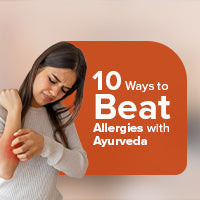 From seasonal sniffles to chronic skin conditions, allergies can disrupt our daily lives. While conventional medicine offers relief through antihistamines and steroids, Ayurveda provides a holistic approach to understanding and managing allergies. In this article, we will talk about ‘effective ways to beat allergies’ tailored to your unique dosha constitution—Vata, Kapha, or Pitta.
From seasonal sniffles to chronic skin conditions, allergies can disrupt our daily lives. While conventional medicine offers relief through antihistamines and steroids, Ayurveda provides a holistic approach to understanding and managing allergies. In this article, we will talk about ‘effective ways to beat allergies’ tailored to your unique dosha constitution—Vata, Kapha, or Pitta.
What are the causes of Allergies as per Ayurveda?
Allergies, as per Ayurveda, are primarily linked to imbalances in the three doshas: Vata, Kapha, and Pitta. These doshas govern various physiological and psychological functions in the body, and an imbalance can lead to allergic reactions. Additionally, Ayurveda identifies triggers and aggravators for allergies, including seasonal factors, dietary choices, and environmental influences.
Vata Allergies:
Vata allergies predominantly occur during the fall and early winter seasons when the qualities of Vata dosha are most prominent. These allergies often manifest with symptoms such as dryness, itchiness, and irritation in various parts of the body, including the skin and respiratory system. Individuals with Vata allergies may experience a fluctuation in the severity and type of symptoms. To alleviate Vata allergies, Ayurveda recommends nourishing dietary choices, especially those that are warm, moist, and grounding. Warm oil massages, such as Abhyanga, are highly beneficial for soothing the dryness associated with Vata allergies. Specific herbal remedies, like those containing Ashwagandha and Shatavari, can help balance Vata dosha and reduce allergic reactions.
Remedies for Vata Allergies
1. Stay Hydrated:
One of the primary goals in managing Vata allergies is to combat dryness. Drink warm water regularly throughout the day to stay hydrated and maintain moisture in your body.
2. Nasya Oil:
Apply a few drops of warm sesame oil or ghee in each nostril. This practice, known as Nasya, helps lubricate nasal passages and prevent irritation.
3. Triphala:
Triphala is an Ayurvedic herbal formulation known for its digestive benefits. It can help detoxify your system and improve digestion, which is crucial for allergy prevention.
Kapha Allergies:
Kapha allergies typically occur during the spring season when the cold and wet qualities of Kapha dosha dominate. These allergies often manifest with congestion, excessive mucus production, and a feeling of heaviness in the body. Symptoms may include nasal congestion, coughing, and a general sense of lethargy. To combat Kapha allergies, Ayurveda recommends a dietary approach that is light, warm, and spicy, as these qualities help counteract Kapha's heaviness and dampness. Steam therapy, like inhaling steam infused with eucalyptus or mint, is highly effective in clearing congestion. Additionally, herbal decongestants, such as Trikatu, can help reduce mucus production and alleviate Kapha-related allergy symptoms.
Remedies for Kapha Allergies
1. Steam Therapy:
Inhaling steam with a few drops of eucalyptus oil can help clear nasal congestion and relieve symptoms of Kapha allergies. This practice is particularly beneficial during the allergy-prone spring season.
2. Spicy Diet:
Incorporate warming spices like ginger, black pepper, and turmeric into your meals. These spices stimulate digestion, reduce mucus production, and alleviate symptoms associated with Kapha allergies.
3. Trikatu Churna:
Trikatu churna is a herbal mixture containing ginger, black pepper, and long pepper. It helps enhance digestion and metabolism, which is essential for balancing Kapha dosha.
Pitta Allergies:
Pitta allergies are often prevalent during the summer months when the hot and intense qualities of Pitta dosha are most pronounced. These allergies typically manifest with symptoms like skin inflammation, redness, and an intense burning sensation. Common Pitta allergy symptoms include hives, rashes, and allergic dermatitis. Managing Pitta's allergies involves adopting a cooling diet that includes foods with sweet, bitter, and astringent tastes, which help pacify Pitta's heat. Stress management techniques are crucial, as stress can exacerbate Pitta allergies. Ayurvedic herbs like Neem and Aloe Vera are known for their cooling properties and can be used topically to soothe skin-related allergic reactions.
Remedies for Pitta Allergies
1. Cooling Diet:
Opt for a cooling diet rich in foods like cucumber, mint, coconut, and leafy greens. These foods help soothe inflammation and reduce the intensity of Pitta-related symptoms.
2. Aloe Vera Gel:
Aloe vera is a natural coolant. Applying aloe vera gel topically can provide relief from skin irritations caused by Pitta allergies.
3. Sitali Pranayama:
Sitali pranayama is a yogic breathing exercise that involves inhaling through a rolled tongue. This practice cools the body and reduces heat-related allergies.
By identifying your doshic imbalance and incorporating these Ayurvedic home remedies into your daily routine, you can effectively manage and prevent allergies. Keep in mind that Ayurveda emphasizes prevention, so maintaining a balanced lifestyle and diet is essential for long-term allergy management.
For personalized guidance and recommendations tailored to your unique constitution and allergies, consult with Jiva Ayurveda’s highly skilled Ayurvedic practitioners. Contact us at +91-9958404040 or visit your nearest Jiva Clinic.







